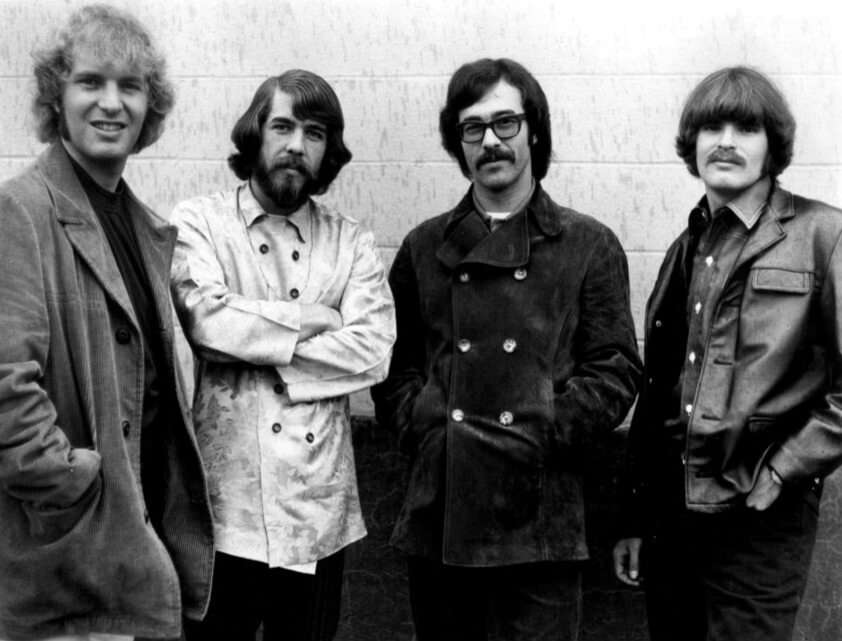
“Chameleon” is CCR’s wary little parable about change—how a person (or a whole band) can shift colors to survive, and still lose something true along the way.
Before the needle even finds the groove, it helps to place “Chameleon” exactly where it lives in the Creedence story: it is track 3 (3:05) on Creedence Clearwater Revival’s Pendulum, released by Fantasy Records on December 9, 1970. The song is credited to John Fogerty, like every track on the album. And it’s important to say plainly—because memory sometimes turns “favorite tracks” into “hit singles”—that “Chameleon” was not the single. Pendulum effectively yielded just one major single pairing: “Have You Ever Seen the Rain” / “Hey Tonight,” released January 1971, which reached No. 8 on the U.S. Billboard Hot 100.
Yet Pendulum itself arrived with real weight. It was CCR’s second album of 1970 (following Cosmo’s Factory), and it went on to peak at No. 5 on the Billboard 200—a high perch for a band that always seemed to travel light: short songs, sharp hooks, no wasted motion. If you want the “moment” around “Chameleon,” it’s this: the band was still commercially powerful, but the ground under their feet was starting to move.
That movement was not only cultural—it was internal. Pendulum was recorded at Wally Heider Studios in San Francisco in November 1970, and accounts of the sessions note that it took longer than was typical for CCR, in part because tensions were rising. Before recording began, Tom Fogerty, Stu Cook, and Doug Clifford pushed for greater creative input from bandleader John Fogerty. Even if you never read a single band biography, you can feel that pressure in the album’s atmosphere: it’s CCR reaching beyond their own template—more keyboards, more texture, more room for the songs to breathe.
Craft Recordings (the catalog home for CCR’s releases) has pointed out another telling detail: Pendulum is the group’s only LP made up entirely of original material, with no blues or rock ’n’ roll covers tucked in as familiar signposts. That choice makes “Chameleon” feel even more revealing, because originality here isn’t a victory lap—it’s a kind of exposure. When you stop leaning on standards, you’re forced to show exactly where you are.
So what is “Chameleon” actually saying?
On the surface, it’s a compact rocker—built to move, not to linger. But the title alone carries its meaning like a shadow. A chameleon survives by blending in, by changing colors to match whatever branch it’s clinging to. In human terms, that’s not always adaptation; sometimes it’s evasion. Fogerty uses the image as a shorthand for the person who shifts shapes depending on who’s watching—friendly when it’s useful, distant when it’s not; loyal in public, slippery in private. The song’s bite isn’t theatrical. It’s practical. It sounds like someone who has watched charm turn into strategy and learned, the hard way, to keep his distance.
Musically, the track also hints at transformation. Commentators and discographic notes around the Pendulum era frequently underline how the album broadened CCR’s palette, and “Chameleon” is often singled out for bringing a more soul-leaning edge than the classic swamp-rock formula—colors added without turning the band into something unrecognizable. You can hear the intention: CCR staying CCR, but allowing the room to fill with new air.
And that is where the song becomes quietly poignant. Because if you listen to “Chameleon” as a piece of its time—late 1970, the optimism of the decade fraying, the music industry getting bigger and stranger—it doesn’t just sound like a warning about other people. It sounds like the uneasy awareness that everyone is changing, including the speaker. Even a band as mythically “straight” as Creedence Clearwater Revival had to navigate shifting expectations: the pressure to expand, to modernize, to keep pace, to stay relevant without losing the simple force that made them beloved in the first place.
That’s why “Chameleon” remains such a compelling deep cut. It’s not dressed up as a message, yet it carries one: change is inevitable, but not always innocent. Sometimes it’s growth. Sometimes it’s disguise. And sometimes, if you’re honest, it’s both at once—one foot searching for a new branch, the other trying not to let go of the old one.